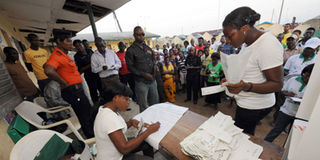Jonathan takes wide lead as election results show sharp north-south rift

Voters gather as officials of the Independent Electoral Commission count votes at a polling centre in Yenagoa, in Nigeria's Bayelsa State, on April 16, 2011, after a crucial presidential election and a bid by Africa's most populous country to hold its cleanest polls for head of state since the end of military rule. AFP | PIUS UTOMI EKPEI
Abuja, Sunday
Nigerian President Goodluck Jonathan has taken a wide lead in elections in Africa’s most populous nation, results showed today, putting him on a possible course for a first-round victory.
Millions of voters turned out for Saturday’s election as Africa’s most populous country bid to put years of rigging and badly flawed ballots behind it and hold the cleanest polls for head of state in nearly two decades.
Observers gave the polls an initial thumbs up, but concerns were raised over regional divisions, a scenario many analysts had hoped to avoid in a country as fractious as Nigeria, roughly split between Christians and Muslims.
Counting actual votes
“There’s good news in this Nigerian presidential election — we’re counting actual votes and people are interested in the count,” said Chidi Odinkalu of the Open Society Justice Initiative NGO.
“And quite bad news — the country is badly divided, north vs south.”
Results from 30 states showed Jonathan had won 20, while ex-military ruler Muhammadu Buhari had nine and the former head of the anti-graft agency, Nuhu Ribadu, had one state.
Nigeria has a total of 36 states plus the Federal Capital Territory, which includes Abuja and the surrounding area.
The results were a combination of those officially announced in Abuja and those not yet reported in the capital but declared at the state level, as well as reports from local media and NGOs.
A candidate must do more than carry the most votes to be declared the winner, with the constitution spelling out that one-quarter of the ballots in at least two-thirds of the states must also be captured.
If that is not achieved, a run-off is to be held, which would throw Nigeria into a scenario it has not experienced since the end of military rule in 1999. The ruling PDP has handily won every presidential vote since then.
Jonathan was especially strong in his native south, while Buhari picked up states in the north, where many saw in him an opportunity to return power to their economically marginalised region.
Largest oil producer
The vote in Africa’s largest oil producer was largely calm despite a number of incidents, including three bomb blasts in the country’s north — one on Friday night and two on Saturday — with one wounding eight people.
Jonathan, 53 and a southern Christian, is the first president from the main oil-producing Niger Delta region.
He had an almost accidental rise to power that culminated with him being thrust into office last year following the death of his predecessor, Umaru Yar’Adua.
His calm approach has led some to call him weak, while others say he is better suited to bringing about change in Nigeria, a nation of some 250 ethnic groups and a population of around 150 million roughly split between Christians and Muslims.
Buhari, a 69-year-old Muslim, has built a reputation as a fighter of corruption, but his “war against indiscipline” during his regime in the 1980s was also accused of outrageous rights abuses.
The results showed that Jonathan leading in the country’s South West, especially Lagos, Ogun, Oyo and Kwara states.
His closest rival, former ruler Buhari, was leading in some parts of the north. But up north, Jonathan is likely to pick up only 25 per cent of the vote.
Although, the Independent Electoral Commission (INEC) is yet to officially announce the results, some political analysts are expecting a run-off.
But Jonathan expressed optimism that he was going to win, saying a run-off would be an expensive affair.
“Nigeria is a very big country...a lot of resources will be needed for a run-off. We pray that whoever wins, will do so at the first ballot,” he said after casting his ballot on Saturday.
Additional reporting by Funke Osae-Brown




